The name Kiai Kanjeng brings firstly to mind Cak Nun, and secondly, the music of the gamelan. Cak Nun? Yes, because he is Kiai Kanjeng’s chief composer. Together, Cak Nun and Kiai Kanjeng comprise a collaboration both dynamic and phenomenal. These compositions introduce the essence of the Kiai Kanjeng-Cak Nun collaboration which has successfully penetrated those dimensions of cultural values and life never before managed by other musical groups. These compositions are what make Kiai Kanjeng more than just a music group. That is because the music of Kiai Kanjeng is not merely heard, so much as felt and experienced.
In 1996, with Cak Nun, Kiai Kanjeng released the album Kado Muhammad. It was very well-received. Hits included Tombo Ati, which was supplemented with a poetic introduction by Cak Nun. Shalawat () songs in praise of the Prophet Muhammad) and Islamic poetic verse fro mall over the Indonesian archipelago won the acclaim of the nation. Tombo Ati was performed at all manner of forums. Kiai Kanjeng achieved an enhanced level of respect in the world of cultural Islam. Perhaps as a result of this, but then again perhaps not, Kado Muhammad ushered in a host of religiously-inspired albums, complete with shalawat and Islamic verse, which became popular with a wide and varied audience. In short, Kiai Kanjeng are a musical group who perform, respect and invigorate the richness of Islamic culture in Indonesia.
Kiai Kanjeng have performed as far away as Naples (7 April 2005), and were presented there with an international music award in appreciation of their performance. They were even asked to leave behind their notation to two of their world, Pembuko I and II, as well as a Demung instrument for the Museum of Classical Music, where Guiseppe Verdi, Robert Wagner, Guiseppe Tartini and Antonio Vivaldi once performed their works and left mementoes of their own art for posterity. What makes Kiai Kanjeng doubly unique is that they have been afforded accolades from the world of classical music yet receive precious little respect or attention in their homeland of Indonesia. .
Kiai Kanjeng appeared in the Pugeran Church in Yogyakarta, Central Java, collaborating with the Catholic congregation there in a number of musical works while guarding the corridors of creed of each faith community. Cak Nun expressed his belief in tolerance among faith communities, using the opportunity to explain the concept of jihad, which is often misconstrued. Furthermore, Cak Nun also clarified other points of ideology and Islamic practice such as the use of the phrase assalamualaikum, helping the Catholic congregation to appreciate and understand the context of its use. The performance was a beautiful one, filled with signs of mutual respect. Again, Kiai Kanjeng are more than a musical group because they use their performances to achieve mutual respect among communities of faith and work to create interfaith harmony.
Kiai Kanjeng’s tour of Europe served to enhance a positive view of Islam, in a world where Islam has tended to be much maligned. On 23 March 2005 Kiai Kanjeng performed on the occasion of The Muslim News Award of Islamic Excellence 2005 in London; and event attended by then-Chancellor of the Exchequer Gordon Brown, who used his speech to express his enthusiasm at witnessing the performance. Once more, Kiai Kanjeng are more than a musical group because they work to represent the best of Indonesia in their brand of cultural diplomacy.
More recently Kiai Kanjeng have performed in a number of areas of Indonesia, during which they have arranged a medley of traditional and regional songs entitled, among others, Indonesia Pusaka. These serve to enhance the spirit of nationalism and a rich national culture. Cak Nun’s work serves also to raise the potential of the Indonesian nation psychologically, historically, anthropologically and eco-genetically, awakening a sense of pride among Indonesians in their country, the image of which has experienced a decline in the eyes of the world. To some audiences Cak Nun has espoused that the Indonesian people could the future leaders of the world! And so, Kiai Kanjeng are more than a musical group because they reignite an awareness of Indonesian pride.
Even though all musical instruments are employed, it is the gamelan that is the essence of Kiai Kanjeng’s music. The name Kiai Kanjeng itself originally stemmed from the gamelan that was used by the group’s arranger Novi Budianto, which was neither pentatonic nor diatonic. While the form of Kiai Kanjeng’s gamelan was originally born of the Javanese variety. Kiai Kanjeng’s gamelan is not Javanese. Instead Kiai Kanjeng have embarked upon a broad musical exploration, which has complemented their work in composing and performing for such a wide variety of audiences. These audiences begin with the ordinary people but range to the professional classes, taking in rickshaw (becak) drivers, the poor and marginalised and extending to state officials and foreign dignitaries. Kiai Kanjeng’s music begins in the Javanese tradition but ranges to Arabic, pop, jazz and extending to other styles. And this is why Kiai Kanjeng are more than a musical group, because they embrace their musical freedom and refuse to be cornered by any one stylistic form.
In 1996, with Cak Nun, Kiai Kanjeng released the album Kado Muhammad. It was very well-received. Hits included Tombo Ati, which was supplemented with a poetic introduction by Cak Nun. Shalawat () songs in praise of the Prophet Muhammad) and Islamic poetic verse fro mall over the Indonesian archipelago won the acclaim of the nation. Tombo Ati was performed at all manner of forums. Kiai Kanjeng achieved an enhanced level of respect in the world of cultural Islam. Perhaps as a result of this, but then again perhaps not, Kado Muhammad ushered in a host of religiously-inspired albums, complete with shalawat and Islamic verse, which became popular with a wide and varied audience. In short, Kiai Kanjeng are a musical group who perform, respect and invigorate the richness of Islamic culture in Indonesia.
Kiai Kanjeng have performed as far away as Naples (7 April 2005), and were presented there with an international music award in appreciation of their performance. They were even asked to leave behind their notation to two of their world, Pembuko I and II, as well as a Demung instrument for the Museum of Classical Music, where Guiseppe Verdi, Robert Wagner, Guiseppe Tartini and Antonio Vivaldi once performed their works and left mementoes of their own art for posterity. What makes Kiai Kanjeng doubly unique is that they have been afforded accolades from the world of classical music yet receive precious little respect or attention in their homeland of Indonesia. .
Kiai Kanjeng appeared in the Pugeran Church in Yogyakarta, Central Java, collaborating with the Catholic congregation there in a number of musical works while guarding the corridors of creed of each faith community. Cak Nun expressed his belief in tolerance among faith communities, using the opportunity to explain the concept of jihad, which is often misconstrued. Furthermore, Cak Nun also clarified other points of ideology and Islamic practice such as the use of the phrase assalamualaikum, helping the Catholic congregation to appreciate and understand the context of its use. The performance was a beautiful one, filled with signs of mutual respect. Again, Kiai Kanjeng are more than a musical group because they use their performances to achieve mutual respect among communities of faith and work to create interfaith harmony.
Kiai Kanjeng’s tour of Europe served to enhance a positive view of Islam, in a world where Islam has tended to be much maligned. On 23 March 2005 Kiai Kanjeng performed on the occasion of The Muslim News Award of Islamic Excellence 2005 in London; and event attended by then-Chancellor of the Exchequer Gordon Brown, who used his speech to express his enthusiasm at witnessing the performance. Once more, Kiai Kanjeng are more than a musical group because they work to represent the best of Indonesia in their brand of cultural diplomacy.
More recently Kiai Kanjeng have performed in a number of areas of Indonesia, during which they have arranged a medley of traditional and regional songs entitled, among others, Indonesia Pusaka. These serve to enhance the spirit of nationalism and a rich national culture. Cak Nun’s work serves also to raise the potential of the Indonesian nation psychologically, historically, anthropologically and eco-genetically, awakening a sense of pride among Indonesians in their country, the image of which has experienced a decline in the eyes of the world. To some audiences Cak Nun has espoused that the Indonesian people could the future leaders of the world! And so, Kiai Kanjeng are more than a musical group because they reignite an awareness of Indonesian pride.
Even though all musical instruments are employed, it is the gamelan that is the essence of Kiai Kanjeng’s music. The name Kiai Kanjeng itself originally stemmed from the gamelan that was used by the group’s arranger Novi Budianto, which was neither pentatonic nor diatonic. While the form of Kiai Kanjeng’s gamelan was originally born of the Javanese variety. Kiai Kanjeng’s gamelan is not Javanese. Instead Kiai Kanjeng have embarked upon a broad musical exploration, which has complemented their work in composing and performing for such a wide variety of audiences. These audiences begin with the ordinary people but range to the professional classes, taking in rickshaw (becak) drivers, the poor and marginalised and extending to state officials and foreign dignitaries. Kiai Kanjeng’s music begins in the Javanese tradition but ranges to Arabic, pop, jazz and extending to other styles. And this is why Kiai Kanjeng are more than a musical group, because they embrace their musical freedom and refuse to be cornered by any one stylistic form.
Translated by Ian L. Betts

































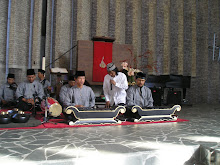
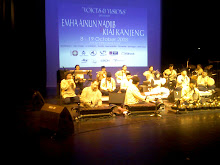

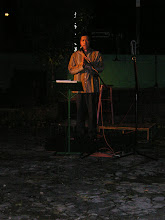



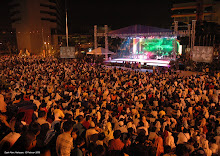
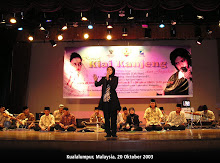
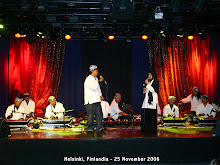.jpg)



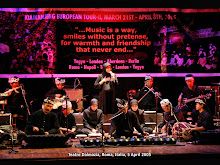


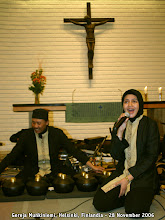.jpg)

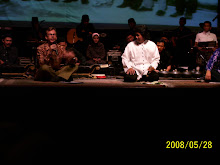.jpg)
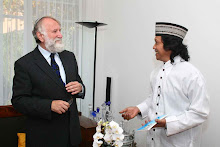
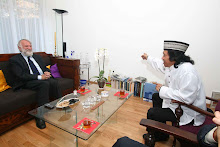
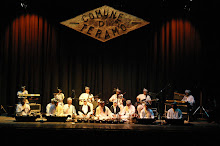


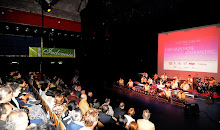

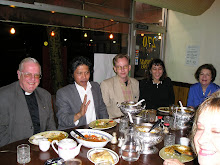


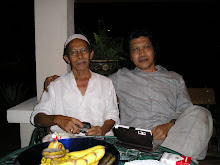
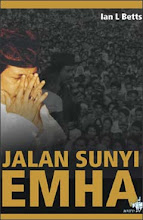
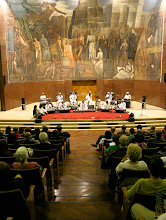
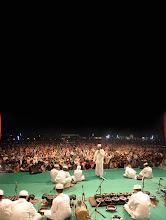

No comments:
Post a Comment